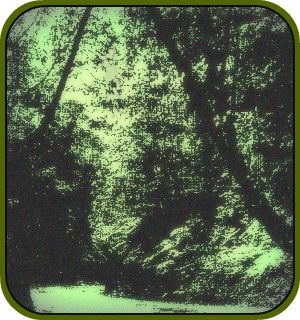
FERN GULLY
THE EDITOR, Sir:- How unfortunate the
"Powers that be" did not take steps to preserve that most beautiful spot, Fern Gully, even as they are now endeavouring to save the Blue Hole area.
Fern
Gully, one of, if not, the most
beautiful
spot in Jamaica, has been brutally
desecrated
for the benefit of the speed
kings, who are not
satisfied unless they can travel at a
breakneck speed, wherever they are going.
Admittedly Fern Gully was a very narrow
and, in
spots, dangerous thoroughfare, but it
meant
that travellers had to go slowly and
carefully, which at least gave them time
to
look around and enjoy its natural and unusual
beauty.
I feel sure if statistics were examined
it would
be found that far less accidents have
occurred on this strip of road than
on the
wonderful new highways now constructed.
How could those in authority have permitted such vandalism? Surely an alternative route could have been developed and this made into a one-way drive, thus eliminating the danger element and yet preserving its beauty.
Does
Jamaica always have to sacrifice its
natural
beauty on the altar of so-called
progress? I can think of no other country in the world that would have premitted such gross sacrilege.
Cannot
something be done to stop this sort of
thing from happening again and again, and
preserve at least what little heritage we
still
have left.
Come
on Mr. Issa, please use your influence,
and save the beauty of Jamaica, not
only for
our own enjoyment but also for
the benefit of
the hundreds of tourists who seek just such
natural beauty as we have to offer.
I am etc.,
ANGELA ARMSTRONG
3, Trafalgar Road,
Kingston 5
July 4, 1961
Daily Gleaner, October 29, 1961
Green Leaf bemoans The Rape of Fern Gully
album, among views of foreign cities, buildings,
lakes, rivers and other landmarks sent to us by the
rare travellers of those far-off days, was a single
Jamaican scene - that of Fern Gully. How vividly
I remember it! A buggy sat like
a ridiculous
decoration among fronds which seemed
almost to be
shaking hands across the
road. That lush verdure I
never saw. My
mother stated categorically that too
many
people passed in too many cars "and
so the
ferns are dying.
Fern
Gully, however, was a fascinating enough gorge, a natural garden that delighted
nature lovers, albeit a road demanding slow
passage until
recent months. Denudement by
the 1951 hurricane
was almost healed; the
ferns, mosses,
alocasia and
philodendron were
returning. How beautiful was the
play of
light and shade, how wonderful the
[varieties]
of leaf forms.
Then
the order went forth that the road be
widened.
A crew of barbarians was let
loose. Pick and shovel rent the
sides of Fern gully, the trees were
felled,
ferns ripped out and the sheltering caves [ ? ].
Fern
Gully now is a ghastly grave, a wound
on the
face of Jamaica. Once this
picturesque valley with
its green sides and
dappled floor was the inspiration
of artists and photographers from many lands.
all the world. Botanists made Fern Gully a mecca of study because there they found enormous variety of
fern species concentrated in a small accessible site.
The
excuse for the vicious wholesale destruction
of
Fern Gully is that motorists had to be
accommodated.
The
lie to that is rarely was there a
road accident in
Fern Gully. Drivers wormed
their way because the
winding, narrow road compelled them to
proceed at a
sane pace. Their passengers
enjoyed respite from
breakneck speed and rested their eyes upon one of
the
largest, most beautiful fern grottoes in all
the
world.
Today,
rather than pass through the charnel house
of Fern Gully many travellers drive extra
miles via
Stewart Town or Port Maria on the
northcoast/Kingston journey.
The
shocking message of the rape of Fern
Gully is
that in the haste of Jamaicans
to grasp what
they
delude themselves is progress, they rip
down beauty
which is irreplaceable. Progress
is not destruction of
what existed. Because
of blundering stupidity,
Jamaica mourns the
loss of Fern Gully. It was the
finest natural garden in the Caribbean.
(From our correspondent): The parish of St. Ann was lashed by rain on Saturday night last resulting in flooded roads and a collection of debris brought down by heavy streams, left on the main road leading from Fern Gully to the Ocho Rios area.
Daily Gleaner, Tuesday, October 15, 1963
Road is source of new springs
OCHO RIOS, St. Ann, Jan. 11 (From our correspondent):
A stream now runs out of the main road at Fern Gully, between Moneague and Ocho Rios.
The water crosses the road in several places.
Source
of the stream is a spring which broke
out at the spot in late December when there was heavy rain
in the area.
Another
spring has broken out on the southern
side of the road and is sending a
second stream
of water
down towards Ocho Rios. It joins the first stream.
Fern Gully main road unsafe for motorists
OCHO
RIOS, St. Ann, Jan. 14 (From our
correspondent): The Fern Gully main road
leading into Ocho Rios
from Moneague has been unsafe for motorists since 11 a.m. today, when the road became flooded and damaged.
Since
heavy rains November 1 to November 17
and on
December 28, the Moneague Lake has been rising
and now covers approximately two acres of land.

the Flora rains of 1963:
'The
Flora flood alerted the late Vernon
James, then
Superintendent of Parks and Gardens, to losses in Fern
Gully. He
utilised fallen trees as barriers and
re-planted
fern. The task lacked supervision.
Workers concentrated on
Roosevelt fern because
it is abundant in that area. I urged
Mr. James to save the nephrolepis [sword ferns] and
adiantum [maidenhair ferns]. Even if they are replanted
who would care for them, he objected.'


FERN GULLY ROAD REOPENED
The Minister of Communications and Works, the Hon. Kenneth Jones has announced that the Fern Gully Road, between Moneague and Ocho Rios in St Ann, which was closed in January because of flood rains is again open to traffic.
The minister said repairs have been hampered by the continuous flow of water from underground, but it has now been possible to divert the streams away from the roadway and into side-drains and culverts.
The road is not yet asphalted, but a temporary marl surface has been laid down. Motorists using the road are advised to proceed with caution particularly if it is wet.
PHALAENOPSIS. About a year ago, Mr Noel Gauntlett, a vice-president of the Orchid Society,
was responsible for establishing a colony of phalaenopsis in Fern Gully. The plants are not
thriving. Indeed, many have died. Drought might be responsible for this loss. Or were the plants too young to have been set out in a place where they
would lack regular care?
A decision should be taken at once to rescue the remaining plants. Either some system of regular
watering and fertilizing needs to be undertaken, or
more feasible perhaps the plants could be removed
to a greenhouse, and brought on until they are
sufficiently strong to withstand the comparative neglect involved in the Fern Gully location.
Pink Phalaenopsis:
A phalaenopsis, of some 200 which were planted in Fern Gully by Mr. Noel Gauntlett, assisted by St.
Ann Boy Scouts, two years ago, has bloomed. Three open flowers of beautiful, round, form were open last week and three forward buds are yet to open.
What is to be hoped is that this notice will not direct the attention of thieves to this courageous
little orchid, so reluctant in the hands of many growers in Jamaica, yet withstood many hazards and denials in Fern Gully. The plant and its companions were the gift of a United States enthusiast who hoped to gladden motorists with the spectacle of phalaenopsis fronds in the twilight of Fern Gully.
But Alex Hawkes was to write of this project in 1970:
'In 1964, under the direction of Jamaica's well known orchidist Mr Noel Gauntlett,
some one hundred specimens of lovely Asiatic Moth Orchids (genus Phalaenopsis)
were planted out high up on suitable trees in the Fern Gully, with the cooperation
of our Boy Scouts. These, with their magnificent racemes and panicles of white and
rose coloured blossoms, shimmering in the shafts of sunlight. would indeed have
added splendidly to the predominant greens of the gully. But I do not believe that
any of these orchids still remain today, having been killed off by the protracted
drought of a couple of years ago, and stolen by vandals.'
FERN GULLY
THE EDITOR, Sir:—The rapid deterioration of
Fern
Gully is becoming more and more obvious each day.
I happen to have driven
through this gorge twice
weekly for the
past three months and observed
with regret
the slow but certain destruction of the
flora particularly on the banks nearest the
road.
This is no way due to lack
of maintenance on the
part of anyone lest this be said.
I
recall as a youngster on driving through
this
beautiful and natural garden, seeing the lush
green fronds of the ferns
almost, touching the
sides of the car and rippling in the wind set up by the motion of it as we drove along.
True
enough, much damage has been caused by
hurricanes, floods, widening of the roads
and
enthusiastic plant collectors, but somehow
Fern
Gully has been able to maintain
some of its
former natural charm up to quite recently.
Over
the past couple years however, a greater
menace to the flora there has come about and
unless something is done and
done quickly to stop
it this vale will
become a barren, uninteresting
and unsightlycanyon and probably a dust bowl
eventually.
The major cause of damage is due to
the great increase in traffic and
particularly
heavy trucks which ply their
way to the
Industrial Centres in Ocho Rios.
Motor
cars contribute to a very small
degree to
this damage, but the fumes
from heavy trucks and
particularly the
diesel burning type are the worst
offenders. Their exhausts are aimed directly on
the
sides of the roads and they emit heavy
discharges of fumes laden with carbon
particles
and carbon monoxide
gas which has quite a
noticeable ill-effect on the plants with which it comes in contact.
Apart
from actual damage to the plants there
is
even a certain amount of danger
to human beings
as well, due to the
fact that the ventilation or air
movement
in the gorge is so limited the air
becomes heavily charged with smoke which
lingers around for long periods and with
the
constant traffic of many
trucks the atmosphere is
seldom ever cleared during daytime or operating
periods.
Many
people who have travelled through Fern
Gully
have complained of nausea, sleepiness, and
burning of the eyes, probably one of
these
symptoms could be attributable to the
winding
roads, but certainly not all three
and it is my
personal opinion than an
air sample should be
taken within the
gorge at peak operation, the
analysis could well indicate it as an hazard to health.
It
appears as if on our march to
economical
progress we are trampling down
the beauty of our
island which is one
thing that attracts visitors,
bestows a sense of pride on our people and provides enjoyment and peace of mind to all.
My
native parish St. Ann once famous for
its
beauty and a well earned title, "The Garden
Parish" now assumes the
appearance of a garden
sprayed with weed
killers. What with the loss of
Roaring
River Falls, the loss of green chlorophyll
in the western seetion of Ocho Rios now
turned
red, the bareness of Dunns River
Falls and now
the much loved Fern Gully? What have we to
offer our
tourists who have heard so much of
these beauty spots before they were
murdered,
and have come to see them? Aren't
we killing our
goose which lays “the
golden egg” (The Tourist
Industry) with
the use of bulldozer blades,
plucking its feathers and leaving raw flesh on
which to stare?
I am, etc,
LEO SULLIVAN.
1 Widcombe Road,
Kingston 6
Feb. 25,1967.
Daily Gleaner, March 10, 1967
FERN GULLY
THE
EDITOR, Sir— There could not be a
more telling letter than that of Mr. Leo A. Sullivan in the Daily
Gleaner of yesterday.
A
few weeks ago I drove up to have a
look at and refresh my memory of Fern Gully. I was amazed. The
ferns are nearly all gone and I did not see more than three or four birds and none of them sang.
Can't
a little good soil be taken there and
put against the edge of the banks along
the roadsides, to replace
that which has been dissipated by the
bulldozer and heavy trucks? In fact no
heavy vehicles should be
allowed on that
road. For there will never, never be
another Fern Gully nor Bamboo Avenue.
Like there
never has been another Roaring River Falls. Poor us!
By
the bye, Sir. Can't the Tourist Board
restore the beauty of Llandovery Falls by
merely clearing the bush
around them? I refer to those that are off the main road but nearby.
I am, etc,
L. C. STEDMAN
Brown's Town,
March 2, 1967
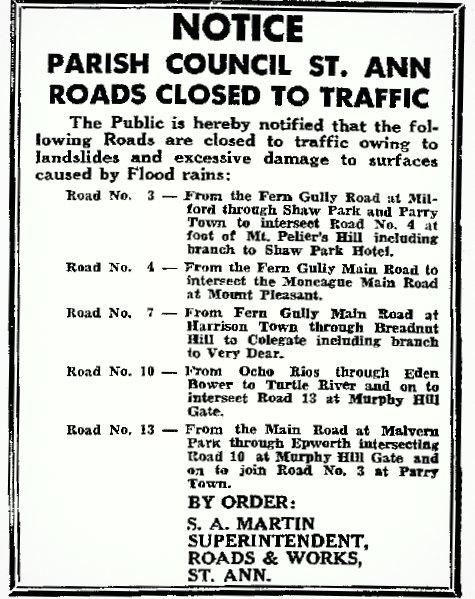
I had heard that Fern Gully had been absolutely ruined by the floods, and on December 5th had occasion to visit the gully.
Coming up into the gully from Ocho Rios, via Harrison Town, the road is indeed in a sad condition, with huge potholes on all sides, and still much evidence of serious washing-out along the border area. A few landslips are to be seen along the way.
But happily the rich fern and other flora of Fern Gully itself seems essentially unaffected. Indeed, perhaps, the plants all seem even brighter in colour and more luxuriant than prior to their prolonged soaking! The upper parts ol the roadway are in excellent condition, the roadside is well maintained and clean. and all in all, the damage to this irreplaceable natural treasure is nowhere near as bad as we had been led to believe.
THE
EDITOR, Sir:— On my many
visits to
the Garden Parish, I have been attracted by the many tourists who frequent Fern Gully.
Perhaps
many may feel that the development of Fern Gully as
an attraction
or beauty spot
is unwarranted, but I
am
fascinated with the uniqueness of the place.
First
of all it is one of the coolest
spots in the
parish for one
to relax in on a hot summer's
day.
Secondly the Gully accommodates
a
number of species of bird life not common to
many parts of Jamaica; and thirdly
Fern
Gully presents both tourist and native with a first hand example of a tropical forest.

Indeed
I think it often presents the
tourist
with the closest
resemblance of a
primaeval
forest he will ever have.
May I
suggest, Mr. Editor, that
in attracting more
people to
visit this peculiar beauty spot, that
the Tourist Board
or the Superintendent of
Parks spare no expense at advertising
this
erstwhile show place!
I
further suggest to these authorities that
the botanical names
of each species of plant
occurring
in Fern Gully be affixed
to the
larger trees or shrubs,
and that at
appropriate points
or "rest spots", a
concrete bench
or chair be positioned
with a
permanent placard giving
a botanical
history of the flora and fauna found in Fern
Gully's precincts.
I am, etc,
A. V. DUNN,
4 Aukland Drive,
Kingston 10
Nov. 10, 1971.

Residents and visitors in the Ocho Rios area were treated last Sunday night to a feast of folksongs by the singers of the National Dance Theatre Company at the newly established cultural (folklore) centre situated just a mile out of Fern Gully.
FERN . . . . The costumed group 'Fern Gully' sponsored by National Cash Register parading around the National Stadium track durIng yesterday's grand gala -- a climax of festival 10
celebration.
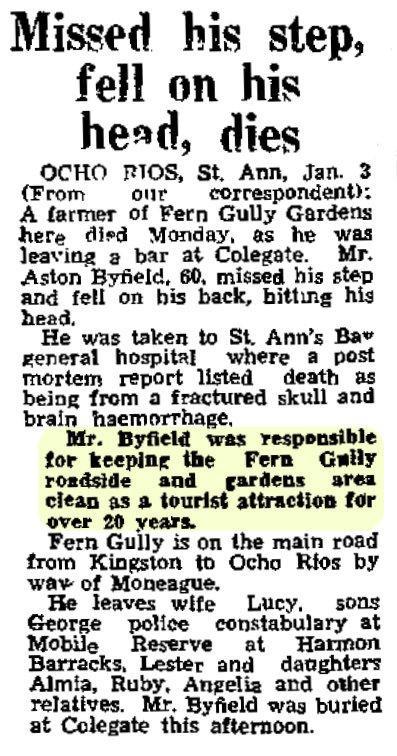
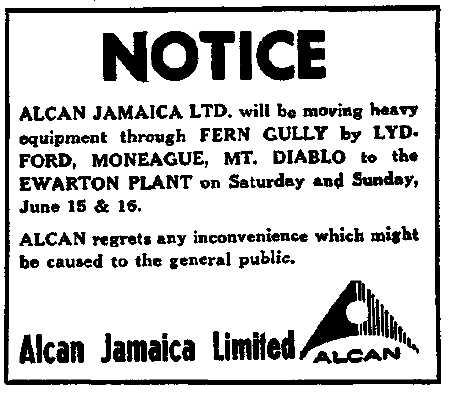

. . . .
The first difficulties were encountered up the inclines of Fern Gully. Here, Ewarton's 988 frontend loader was used to push from behind.
The procession arrived at Moneague at noon, where everyone took a break. A fire was lit and a hearty roadside meal prepared.
Mr. Pagon went on to deal with road programmes funded locally, stating that $3.76 million provided for main road improvement, involving nine major projects, was increased by $101,000 in the First Supplementary Estimates for urgent improvement works in Fern Gully.

Minister of Works and Communications.
THE EDITOR, Sir. The sudden and untimely passing of Dr Alex Hawkes should be mourned by persons of
culture. His contribution to our historical and horticultural heritage cannot be told in words.
I have met him time and again in the rural area enjoying the serenity of nature with such ease and charm
truly enveloped in the joys that come from knowing nature. I was an avid reader of what he wrote and also
noted the advice he gave on cooking on the radio His departure is another mile stone in the rich heritage of
Jamaica culture that "outsiders" have so vividly dramatized
May his soul rest in peace
I am etc
H. LYNCH-CAMPBELL
April 2, 1977.
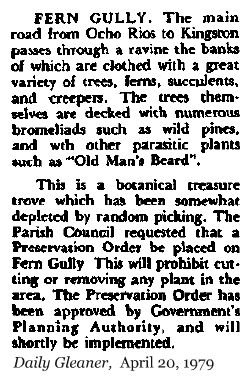
Cindy Loggins in the HOUSTON CHRONICLE, May 20, 1979
OCHO RIOS was late in coming into Jamaica's tourism mainstream. Up to a decade ago, Jamaica's second largest tourist resort was being variously described as "a small cross-roads village at the head of a palm-fringed bay", and "a sleepy fishing village."
. . . .
The trip from Kingston to Ocho Rios runs through beautiful countryside, including Fern Gully, a three-mile roadway with numerous twists and turns through a canopy of lush forest foliage and ferns. It is this kind of vegetation, as well as the countless cascading streams, that led the Spaniards to call the area Chorreras (waterfalls). It is generally accepted that it is from this Spanish word that the name 'Ocho Rios' was derived.
Jamaica Tourist Board, Daily Gleaner, June 11, 1979





